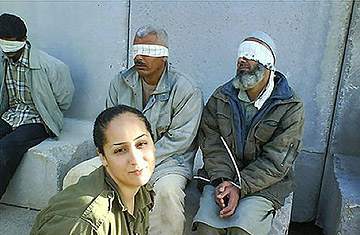
This picture, originally posted on Eden Aberjil's Facebook page, and taken from the Israeli blog sachim.tumblr.com, allegedly shows Aberjil posing in front of blindfolded Palestinian prisoners
So much passes so easily through the permeable membrane separating the brain from the keyboard. But even after she thought about it, Eden Aberjil could not understand all the fuss over her Facebook photo album chronicling her days in the Israel Defense Forces (IDF).
"IDF — the best time of my life" features shots of her standing beside some Palestinian men. She is the one in uniform, beaming at the camera. They sit behind her, bound at the wrist and blindfolded, stoic captives as unaware of at least one aspect of their humiliation — the camera — as Aberjil remained after the whole thing went viral.
"I don't understand," she told a radio station after the story broke this week. To a newspaper, she said, "I just documented my routine and posted the pictures as a way to remember."
The latest black eye for Israel is also, of course, a fresh reminder that the Jewish state, so impressive militarily, looks more than a little lost on the global battleground, where the winner is decided by public opinion. It's all become a matter of perspective, not to mention situational awareness. "This is one of the major arenas, if not the arena, where the whole conflict against Zionism is taking place," says Einat Wilf, a newly elected legislator to the Knesset from the Labor Party, referring to the philosophy behind the creation of Israel. "And Israel has to win it, as Israel has won all its previous wars. But it will take time."
Wilf, a member of the foreign affairs and defense committee, emphasizes that the degradation of the Palestinian prisoners was morally wrong. She calls for more rigorous ethics training but adds, "We need to think about messages. How do we deprive the other side of the images it wants? The other side wants to see images of conflicts with soldiers. We shouldn't give them that."
The day before the Facebook story broke, Naftali Bennett was instructing volunteers on how to edit Wikipedia to feature Israel's perspective more prominently in entries like "Gaza flotilla raid," which countless people typed into search engines on May 31 after hearing that Israel had killed civilians on a relief ship bound for the embargoed Gaza Strip. "A great example," says Bennett. "For the first 10 hours or so, Israel was virtually silent, even though we had footage of terrorists with knives and clubs. These weren't human-rights activists, but it took 10 hours to get that out."
"Right now, Israelis are more and more realizing the real battle isn't the military," continues Bennett, who heads an organization of West Bank settlers. "It's the battle for the minds and hearts of the people of the world, because from the Gaza war to the flotilla, there's a common pattern from one conflict to another to tie Israel's hands more and more. Today one of the biggest threats to Israel is our inability to use our military to protect ourselves because of international public opinion."
The Israeli military was, like Bennett and Wilf, emphatic in condemning Aberjil, who left active service last year. "On the face of it, it appears that this was coarse and ugly behavior by the soldier," the army said in a statement. "This behavior does not reflect IDF values and norms expected of soldiers." But that brought mocking laughter and the release of a flurry of similar Facebook photos from Breaking the Silence, a group of former Israeli soldiers who advocate ending the occupation of Palestinian territories because of what it's doing to the young Israelis enforcing it. "The first time you enter a house in the middle of the night and see the children crying because your face is painted, you feel something, but the next time less and less and less, and slowly, slowly you cross lines you never thought you'd cross," says Yehuda Shaul, one of the group's founders. "This is what needs to be talked about."
Shaul tells TIME he was taken aback at the outrage over Aberjil's posting, which struck him as remarkably tame. He described duty in a refugee camp eight years ago, when his squad sought out a Palestinian house with a satellite dish, locked the family in the basement and took photos of one another drinking Fanta and watching a World Cup match on the family's TV. "The story is not the image of Israel," says Shaul. "The story is what we do."
